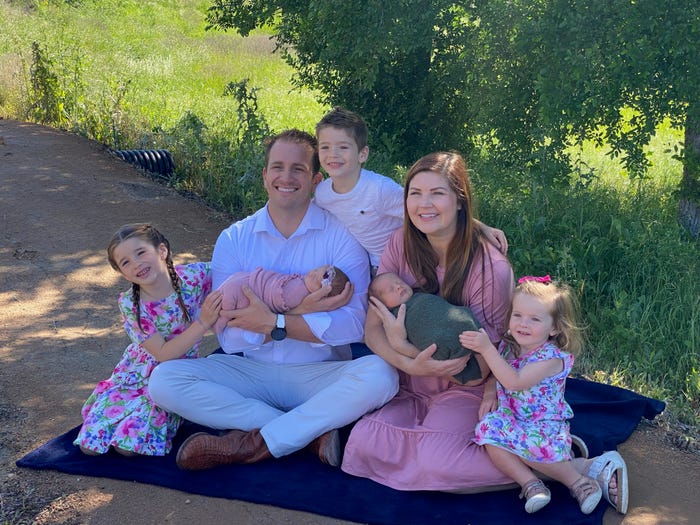A millennial who retired at 32 explains the ‘life happiness index’ he used to decide to go back to work after 8 months
6 min readA millennial who retired at 32 explains the ‘life happiness index’ he used to decide to go back to work after 8 months

- Jace Mattinson returned to work after finding early retirement unfulfilling and repetitive.
- He initially retired at 32 after selling a lumber company but wanted to return to the office.
- Mattinson aims to balance work, family, and hobbies using a “life happiness index” as a guide.
Jace Mattinson, 36, has already determined that retirement is overrated. Four years ago, he tried it out for eight months, then realized he felt like he was throwing away a decade of hard work and low-sleep nights.
When he started his financial independence journey, he thought retirement would be 30 years out. But at 32, he had enough to never work at an office again. However, he said, the appeal of retirement, from playing golf to relaxing on a boat, got stale fast.
He wanted to get back into the workforce and return to an executive position, which brought him much more fulfillment. He also wanted to be a role model for his kids, who saw their dad as someone motivated less by money and more by genuine passion.
So he did just that, working slightly fewer hours but maintaining a strong balance between work, family, and hobbies. It’s all part of his “life happiness index” that drives his financial and life decisions.
“I decided that retirement in the traditional sense was not something that is going to happen for myself anytime soon,” Mattinson told Business Insider.
Mattinson is one of many members of the FIRE community — financial independence, retire early — who has gravitated away from the “RE” part of the acronym. Some previously told BI that after testing out retirement, they felt directionless or bored, itching to return to the workforce. Some wanted to resume their past jobs, while others looked to lower-stress roles like nonprofit or charity work.
Retiring early, but not for long
Mattinson started his career at PwC as an associate in Dallas making $52,000 a year after graduating from Brigham Young University. He quickly rose the ranks at an outsourced accounting firm making about $150,000, where he became a partner and relocated from Dallas to Austin.
One of his clients worked in the lumber building material hardware distribution space, and at 27, he took over a lumber company which was struggling. At this time, he was making in the mid-six figures, putting much of that money into various retirement and investment accounts.
After working long weeks, he sold the company at 32 for seven figures and reached the amount he needed to retire comfortably while providing for his five kids. He said he was living on just $30,000 to $40,000 a year, as most of his earnings went to maxing out his retirement accounts and investing in real estate.
“I skipped over five years like it was nothing, but if you ask my wife, there were some extremely tough years,” he said. “I was gone a few nights a week at a minimum. I had operations all over Texas and Oklahoma. And I spent a lot of time trying to build up this company.”
During this time, he acquired a real estate portfolio in Texas, taking advantage of house hacking and other strategies to have extra passive income.
He said he was drained after years of nearly nonstop work and figured that he would never have this kind of freedom again after selling the company. He took a “mini-retirement” that included golfing as much as four times a week, skiing, playing basketball, and boating.
A few months in, he realized his hobbies were getting repetitive and boring. He felt disengaged from his work and social communities, and a part of him felt his quick rise up the corporate ladder was being neglected. He wasn’t worried about money, though, as he had plenty in investments and hadn’t yet deployed much of the large cash infusion from the company’s sale.
“I didn’t think I was going to close up shop forever, but it was like, maybe I’ll take a bunch of time off,” Mattinson said. “But after about eight months of that mini-retirement, I decided that I had way too much time on my hands to not be engaged.”
He didn’t view the mini-retirement as a complete mistake, as it helped him recharge and reconsider his values. But he eventually noticed he wasn’t “wired” to relax for long periods, and he wanted to pursue his passions of growing his investments and real estate portfolio — or, in other words, work.
“I had this mindset shift of, I’m pretty young, and I don’t want to essentially be retired,” Mattinson said. “I didn’t want my kids growing up thinking that daddy worked really hard at one point, but now he hangs out and goes golfing all the time.”
Returning to work
He decided to find new challenges in the lumber distribution space, which he said was much more fulfilling than doing his hobbies every day. He’s now an executive at a lumber building materials company doing another nationwide roll-up.
He continues to invest in franchises and real estate and has had a podcast for seven years. He has a three-bucket investment strategy of investing in the market, business, and real estate.
He recently shifted from a scarcity mindset of wanting to save and DIY everything to an abundance mindset of investing more in what matters and splurging on things that make life easier. He still enjoys yard work but pays for house cleaning or laundry.
He keeps track of a “life happiness index,” which he said is highest when he balances his work with family and hobbies. He tries to maximize this index by pursuing work in areas such as investment and distribution. He considered switching to charity work or other lower-stress options, though he said the best use of his talents, from an impact standpoint, was returning to the field he left.
As part of this, he’s less on top of his family’s budget than he used to be, spending roughly what he thinks they should but no longer tracking every dollar. He’s also been putting aside money for community improvement projects that could benefit others long-term.
“I don’t try to nickel and dime myself if it doesn’t make me happy,” he said. “I don’t want to be a billionaire by any stretch of the imagination, but there are things that I would like to do after I’ve shifted my mind. I would love to create a park one day, for example, in my area that has all different equipment.”
He schedules one-on-one time with his kids, plays basketball twice a week, and makes time for tennis or golf with friends, all of which take precedence in his schedule.
When considering his “final” retirement, he said he plans to work as long as he enjoys it. While he doesn’t want to be a “full-time parent” and needs work to keep him going, he’s increasingly trying to pick up and drop off his kids at school and attend their sporting events.
“As long as I’m able to continue to take enough vacations, travel, do some of the things that I’ve always liked doing locally, and do some of my hobbies a few times a year, I’m in a pretty good spot,” he said.
Are you part of the FIRE movement or living by some of its principles? Reach out to this reporter at nsheidlower@businessinsider.com.
Discover more from Slow Travel News
Subscribe to get the latest posts sent to your email.



